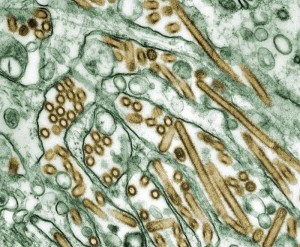The U.S. Department of Agriculture is creating a stockpile of avian influenza vaccines, but an expert suggests careful consideration of the strategy and cautions that the strain of the next outbreak is unknown.

Wild birds are typically the source of the introduction of the virus to backyard and commercial poultry flocks, which makes it very difficult to know the strain and understand the nature of the incoming virus until after the outbreak has occurred in poultry populations, said Suresh Mittal, a professor of comparative pathobiology in Purdue University’s College of Veterinary Medicine.
In 2015, 15 U.S. states had bird flu outbreaks at poultry farms, which led to the loss of more than 48 million birds and $3 billion in revenue, as well as a pricier Thanksgiving dinner. The virus can infect chickens, turkeys, ducks, pheasants, quail, geese and guinea fowl, as well as wild birds, according to the USDA Animal and Plant Health Inspection Service and testimony at a special hearing of the Senate Committee on Agriculture, Nutrition and Forestry.
The U.S. Department of Agriculture issued a second request on Nov. 20 for proposals from manufacturers as it works to create an emergency stockpile of avian influenza vaccines.
Mittal said the USDA should carefully consider its vaccine selections and cautions that the virus can quickly change. While his research focuses on the creation of a vaccine that offers broad protection against multiple strains and mutations of the avian influenza virus, he is not working with a manufacturer or in a position to submit a proposal for the stockpile.
“Protecting poultry from avian influenza is complicated and there is much to consider as the USDA’s Animal and Plant Health Inspection Service makes its decision about vaccine use,” Mittal said. “What works against the viruses infecting birds today may not work against the virus we face tomorrow, as it rapidly mutates to avoid attack from the immune system. Luck – or a vaccine effective against a broad range of strains – is needed for an emergency stockpile to work when an outbreak hits.”
Read the Purdue news release HERE

